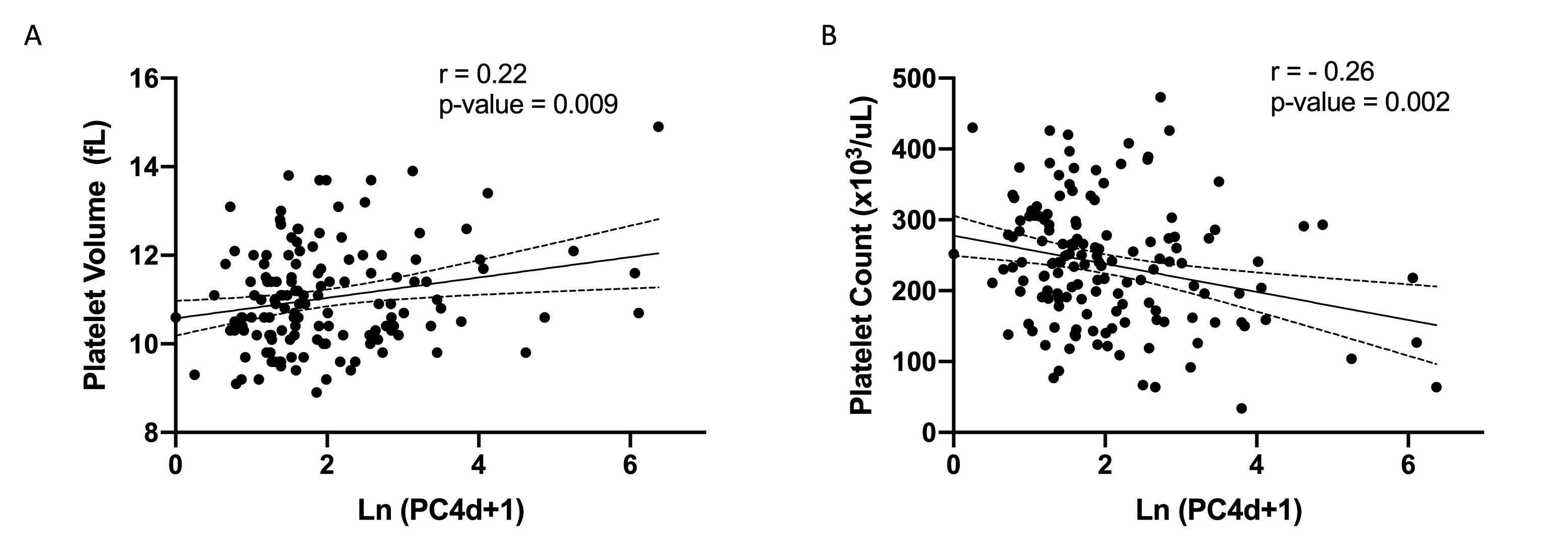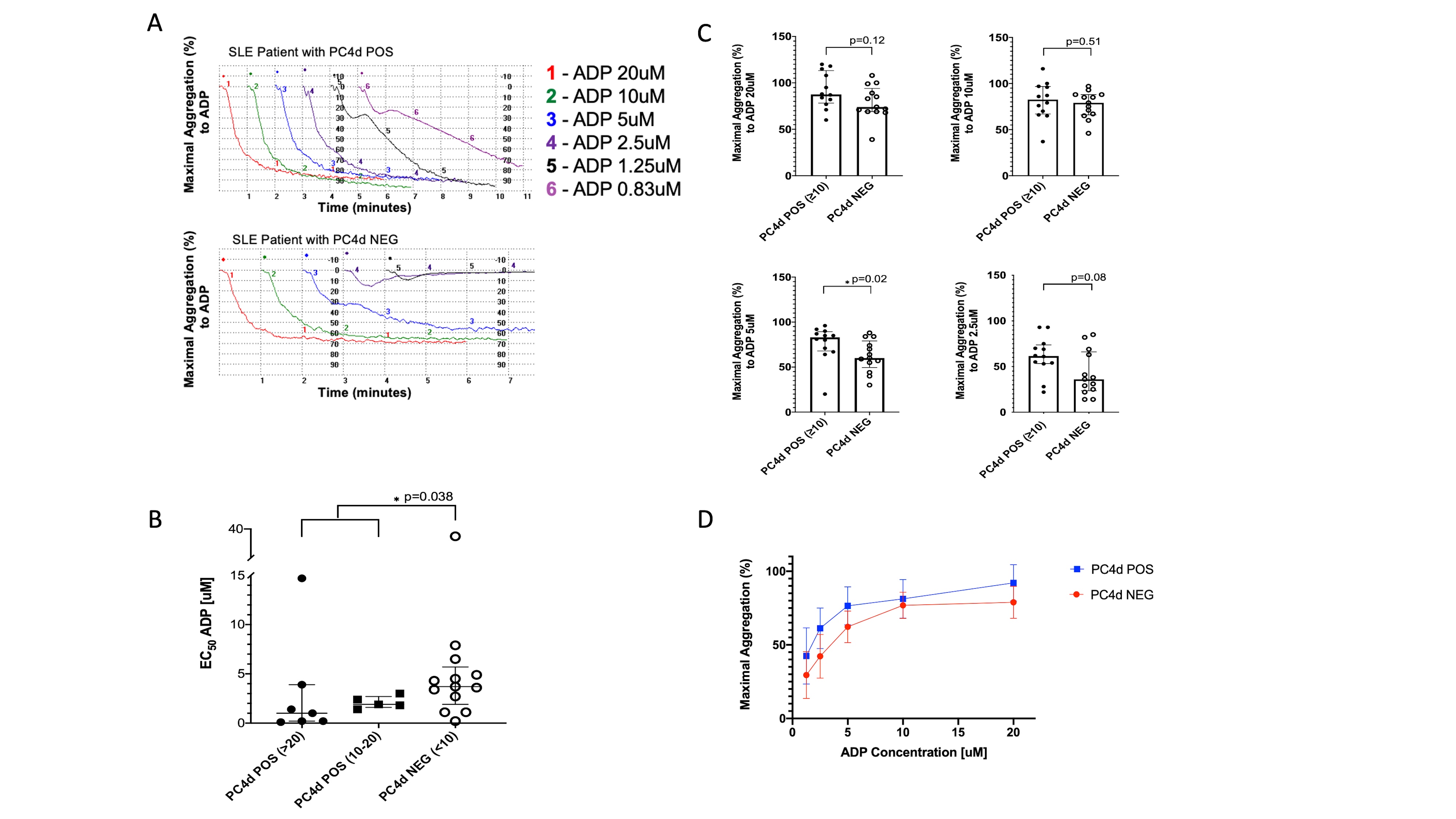Session Information
Date: Sunday, November 8, 2020
Title: SLE – Diagnosis, Manifestations, & Outcomes II: Bench to Bedside (1507–1511)
Session Type: Abstract Session
Session Time: 3:00PM-3:50PM
Background/Purpose: Platelets have a well-defined role in arterial thrombosis, and platelet-bound complement activation products (PC4d) correlate with vascular thromboses in patients with Systemic Lupus Erythematosus (SLE). The mechanistic link between PC4d and thrombosis has not been studied to date.
Methods: Using a cross-sectional design, we evaluated the associations between PC4d and arterial thrombosis, as well as between PC4d and platelet volumetric measures (count and volume). Platelet reactivity was assessed using the gold-standard technique of light-transmittance aggregometry (LTA). Decreasing doses of adenosine diphosphate (ADP) were used to induce platelet aggregation; a dose-response curve for ADP vs maximal aggregation was constructed for each patient. The ADP concentration at which 50% of maximal aggregation defined the EC50. Patients on anti-platelet agents were excluded.
Results: 150 SLE patients were included; their average age was 40±13 years, 38% were antiphospholipid antibody (aPL) positive, 18% were taking prednisone >7.5mg/day, 29% had hypertension, 19% were smokers, 5% had diabetes, mean total cholesterol and LDL 173±52 and 93±41 respectively. Thirteen arterial events (5 myocardial infarctions, 8 strokes) occurred within 5 years of enrollment. Arterial events were associated with PC4d levels (log transformed given positive skewness): for every one unit increase in log PC4d the odds of an arterial even increased by 70% (OR 1.7, p< 0.05) when adjusting for the significant covariates identified on the univariable analysis (aPL, smoking, and prednisone >7.5mg/day use). A PC4d cutoff of 10MFI had the greatest area under the curve of 0.71±0.08 for detecting arterial events.
PC4d levels correlated with lower platelet counts (r=-0.26, p=0.002) and larger platelet volumes (r=0.22, p=0.009). Platelet aggregation was tested in 12 patients with PC4d net MFI and 13 patients with PC4d< 10; aPL were present in 5/12 and 7/13 patients in each group. EC50 values were significantly lower in patients with PC4d10 net MFI compared with PC4d< 10 (1.6 vs. 3.7, p=0.038). The maximal aggregation response in PC4d positive patients, as compared to PC4d negative patients, trended towards greater aggregation at all concentrations of ADP agonist, and was statistically significant at 5 µmol.
Conclusion: PC4d is associated with arterial events in SLE. PC4d platelets were fewer in number, larger, and hyper-aggregable, suggesting that PC4d may be a mechanistic marker for vascular disease in SLE.
 Figure 1: PC4d levels correlate with mean platelet volume and count. Correlation between PC4d levels, natural log transformed (Ln), and A, mean platelet volume and B, platelet count. r is the Pearson’s correlation coefficient.
Figure 1: PC4d levels correlate with mean platelet volume and count. Correlation between PC4d levels, natural log transformed (Ln), and A, mean platelet volume and B, platelet count. r is the Pearson’s correlation coefficient.
 Figure 2: PC4d POS (PC4d≥10) platelets, as compared with PC4d NEG (PC4d≤10) platelets, aggregate more in response to addition of ADP agonist. A, Representative platelet aggregation curves from a PC4d POS patient (top) and a PC4d NEG patient (bottom). Decreasing concentrations of ADP agonist were added to platelet rich plasma and the aggregation response was recorded for six minutes. B, Platelet aggregation was analyzed as EC50, expressed as the ADP concentration [uM] that achieves 50% of the maximal aggregation. A lower EC50 indicates greater platelet sensitivity to the addition of the platelet aggregation agonist. C and D, Maximal platelet aggregation response after the addition of 20, 10, 5 and 2.5uM ADP agonist. Bars show the median ± IQR; Patients on aspirin were excluded. *p-value≤0.05.
Figure 2: PC4d POS (PC4d≥10) platelets, as compared with PC4d NEG (PC4d≤10) platelets, aggregate more in response to addition of ADP agonist. A, Representative platelet aggregation curves from a PC4d POS patient (top) and a PC4d NEG patient (bottom). Decreasing concentrations of ADP agonist were added to platelet rich plasma and the aggregation response was recorded for six minutes. B, Platelet aggregation was analyzed as EC50, expressed as the ADP concentration [uM] that achieves 50% of the maximal aggregation. A lower EC50 indicates greater platelet sensitivity to the addition of the platelet aggregation agonist. C and D, Maximal platelet aggregation response after the addition of 20, 10, 5 and 2.5uM ADP agonist. Bars show the median ± IQR; Patients on aspirin were excluded. *p-value≤0.05.
To cite this abstract in AMA style:
Gartshteyn Y, Mor A, Shimbo D, Khalili L, Kapoor T, Geraldino-Pardilla L, Alexander R, Dervieux T, Askanase A. Platelet-bound C4d Is Associated with Platelet Activation and Arterial Thrombotic Events [abstract]. Arthritis Rheumatol. 2020; 72 (suppl 10). https://acrabstracts.org/abstract/platelet-bound-c4d-is-associated-with-platelet-activation-and-arterial-thrombotic-events/. Accessed .« Back to ACR Convergence 2020
ACR Meeting Abstracts - https://acrabstracts.org/abstract/platelet-bound-c4d-is-associated-with-platelet-activation-and-arterial-thrombotic-events/
